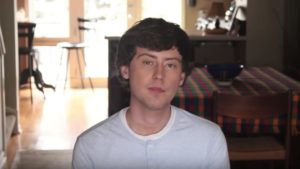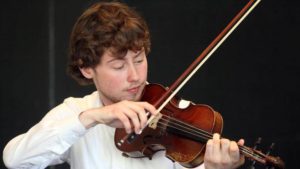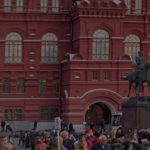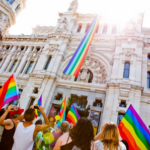By Artem Kolesov
CNN: “Artem Kolesov is a 23-year-old Russian violinist currently pursuing a master’s at Roosevelt University in Chicago. The views expressed in this commentary are his own.”
One month ago, I could barely breathe as I recorded a video which I knew would change the course of my life. After 23 years of living in the closet, I was finally coming out on YouTube, for all the world to see.
As the son of two Russian Pentecostal pastors in Maloyaroslavetz, a small town an hour outside Moscow, I grew up believing being gay was an abomination — a sin that guaranteed me a one-way ticket to hell.
For as far back as I can remember, I’d sit in church and listen as my father and other elders of my church preached homophobia to their loyal congregants. Though it was often a taboo subject to explicitly discuss (“gay” was considered an unholy word), when they did, they’d say that the United States is suffering because of its large gay population. All the mass shootings and terrorism its people experience could be linked to the sins of the homosexual community, in their view. And with every such sermon, I’d walk away slightly more ashamed of my sexual identity than the day before.
It didn’t help that I lived in one of the most conservative countries in the world. On television and in magazines, commentators would refer to homosexuality as a “Western disease,” one that turned upstanding Russian citizens into degenerates.
I wasn’t the type who wanted, or even knew how, to take on the church and the state-sponsored media.
But I knew I was gay. In fact, I’d known I was gay since I was 5 years old. I remember watching a cartoon called “The Dog of Flanders” and feeling a deep love and affection for the male character. At first I didn’t think much of it, but when I realized that my brothers preferred the female characters, I knew I was different — and that perhaps something must be deeply wrong with me.
And so for 18 years I kept silent — quietly hating myself for what I was and could not change, no matter how hard I tried.
So what happened between those fire-and-brimstone sermons and the YouTube video last month; what gave me the confidence to finally speak my truth? Time — and a journey across three countries, which exposed me to a world in which being gay was acceptable and even embraced.
When I was 16, I was given an opportunity to study violin at Dalhousie University in Halifax, Canada. Leaving the cultural and religious conservatism behind, I ventured across the Atlantic to Canada. There, I was exposed to a more liberal society — one where being gay wasn’t entirely sinful or shameful. In my first three days in town, I saw LGBT couples kissing, holding hands and openly expressing their affection toward each other.
Of course, I didn’t immediately embrace this community. The Christian conservative in me was very much still at war with the gay part of my identity.
It didn’t help that my conservative brother had also moved to Halifax with his young family. With him so close by, I knew there was a limit to just how free and open I could be.
I had to cross one more border — this time to the United States — before I fully embraced my sexual orientation. I came to Chicago as a master’s student to study violin at Roosevelt University. There I was exposed to even more vibrant LGBT community.
It felt, as cliché as it sounds, as if I had stepped into an “oasis of liberalism.” And my brother was over 1,500 miles away — too far to be able to track my every move. There I began to mingle with other members of the gay community, and even started openly dating my (now fiancé) boyfriend. All of this had felt like a fantasy until then.
Growing up in Russia, I stayed silent because I couldn’t envision an alternative universe where being gay was socially or religiously acceptable. I didn’t know any “out” gay people in my school or community. There were no gay characters in the books I read or the movies I watched. And I didn’t travel much beyond my small town and its thinking.
But in the West, both in Canada and the United States, I saw a different world. Not only were gay people on TV, in movies and active on social media, but they are also given a voice and a platform to speak their truth. By being visible and open, they made it easier for people like me to accept my sexual identity.
In putting my video on YouTube, I was hoping to reach those scared young Russian men and women, the ones who’ve been told homosexuality is a fate worse than death, and expose them to a new reality — one where some Russians, myself included, are gay and surviving.
And while the government controls the media and regularly censors the Internet, my story — a form of “gay propaganda” under current Russian law — has still managed to be viewed by old friends back home. In fact, they’ve reached out and told me how important this video has been in helping them come to terms with their own identities.
As a child and teenager, I experienced so many bouts of isolation and depression. I even contemplated and attempted suicide. I felt alone, and in many ways, I was. But I don’t want other closeted gay Russians to share my negative experience. And based on the reactions I’ve received to my video so far, I believe I am helping to strengthen those who are not safe to be open about who they are.
Of course, the West isn’t perfect either. Heterosexual people still make homophobic slurs, such as “that’s so gay,” and in many neighborhoods, it’s not safe for gay couples to walk down the street holding hands. But at least the government protects the gay community; so much so that I could take the risk of making a video and putting it on a platform for all to see without fearing for my life.
Posted from CNN: http://www.cnn.com/2017/05/04/opinions/gay-russian-violinist-opinion-kolesov/
















